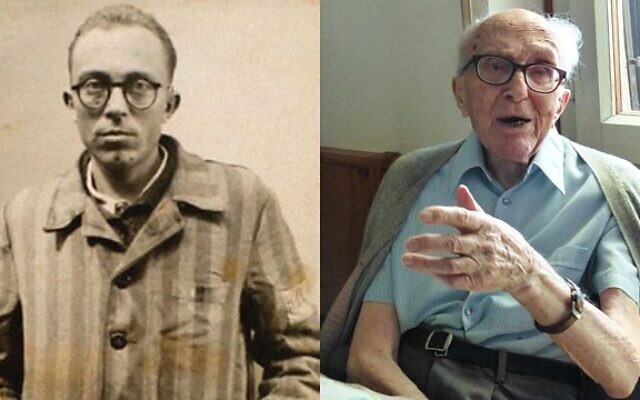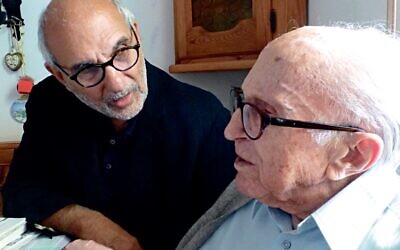Oldest Holocaust survivor, author Boris Pahor, dies aged 108
Pahor lived through spells at the Dachau, Mittelbau-Dora, Harzungen and Bergen-Belsen death camps, after being captured while fighting for the Slovene Partisans against the Nazi occupation in World War II.

The oldest Holocaust survivor Boris Pahor has died at the age of 108.
Pahor endured spells at the Dachau, Mittelbau-Dora, Harzungen and Bergen-Belsen death camps, after being captured while fighting for the Slovene Partisans against the Nazi occupation in World War II.
He was also held at Natzweiler-Struthof in France’s Alsace region, which held 52,000 for resistance work – just over half survived..
Pahor was best-known for ‘Necropolis’ (1967), an autobiographical novel translated the world over, and written after a visit to a Nazi camp where he had been held 20 years earlier.
It depicted the brutality and horror of what he had seen – and his guilt at surviving.
He was born on August 26, 1913, in what is now Italy’s northeastern coastal city of Trieste – which had been part of the Austro-Hungarian empire and home to a big Slovenian community.

The city became part of Italy in the post-World War I break-up of the defeated empire, and the Slovenes were banned from speaking their own language and subjected to a campaign of “Italianisation”. Names were Italianised. Slovenians were arrested, and resistors executed.
He realised s a teenager in Trieste he was one of the “bugs” that Mussolini wanted to crush and vowed loyalty to his Slovene identity.
“I started to put my identity on paper, to write about my street, the sea, the quays. I conquered the town in Slovene,” he said.
Pahor was arrested by the Nazis in 1944 for his involvement with the anti-fascist Slovenian resistance.
In a 2019 BBC documentary The Man Who Saw Too Much, he described being beaten by the Gestapo before being sent to Dachau.
“They started to beat me with leather straps – one on the right and one on the left – each with a whip, all over my body,” he said. “I was screaming. They didn’t care. They had the radio on. My back was like a zebra when I went back to the jail.
“But at least they didn’t use electricity. If they had, as they did with the Communists, I am not sure I could have kept silent.”
Pahor later in life stood for European and regional elections for the Slovene Union party, representing Italy’s Slovene minority – more than 80,000 people.
Pahor received Slovenia’s highest award for cultural achievement after it became independent from the disintegrating Yugoslavia in 1991, and was appointed to its Academy of Sciences and Arts.
“In this Europe, dominated by the economy, the minorities, their culture and their language do not have the place that they deserve,” he told AFP.
“I deal with the past because I am interested in the future. The past was bad and should not be repeated.
“Since I had come out of the concentration camps alive, I had become indifferent to the passage of time. I do not stop, I look ahead.”
Italian President Sergio Mattarella hailed Pahor as a “witness and victim of the horrors caused by war, by inflated nationalism and totalitarian ideologies”.
Italian Culture Minister Dario Franceschini said: “With the passing of Boris Pahor we have lost a great writer, a giant of the 20th century who was able to tell the horrors of the concentration camp with skill and clarity, pulling no punches.”

Thank you for helping to make Jewish News the leading source of news and opinion for the UK Jewish community. Today we're asking for your invaluable help to continue putting our community first in everything we do.
For as little as £5 a month you can help sustain the vital work we do in celebrating and standing up for Jewish life in Britain.
Jewish News holds our community together and keeps us connected. Like a synagogue, it’s where people turn to feel part of something bigger. It also proudly shows the rest of Britain the vibrancy and rich culture of modern Jewish life.
You can make a quick and easy one-off or monthly contribution of £5, £10, £20 or any other sum you’re comfortable with.
100% of your donation will help us continue celebrating our community, in all its dynamic diversity...
Engaging
Being a community platform means so much more than producing a newspaper and website. One of our proudest roles is media partnering with our invaluable charities to amplify the outstanding work they do to help us all.
Celebrating
There’s no shortage of oys in the world but Jewish News takes every opportunity to celebrate the joys too, through projects like Night of Heroes, 40 Under 40 and other compelling countdowns that make the community kvell with pride.
Pioneering
In the first collaboration between media outlets from different faiths, Jewish News worked with British Muslim TV and Church Times to produce a list of young activists leading the way on interfaith understanding.
Campaigning
Royal Mail issued a stamp honouring Holocaust hero Sir Nicholas Winton after a Jewish News campaign attracted more than 100,000 backers. Jewish Newsalso produces special editions of the paper highlighting pressing issues including mental health and Holocaust remembrance.
Easy access
In an age when news is readily accessible, Jewish News provides high-quality content free online and offline, removing any financial barriers to connecting people.
Voice of our community to wider society
The Jewish News team regularly appears on TV, radio and on the pages of the national press to comment on stories about the Jewish community. Easy access to the paper on the streets of London also means Jewish News provides an invaluable window into the community for the country at large.
We hope you agree all this is worth preserving.





















